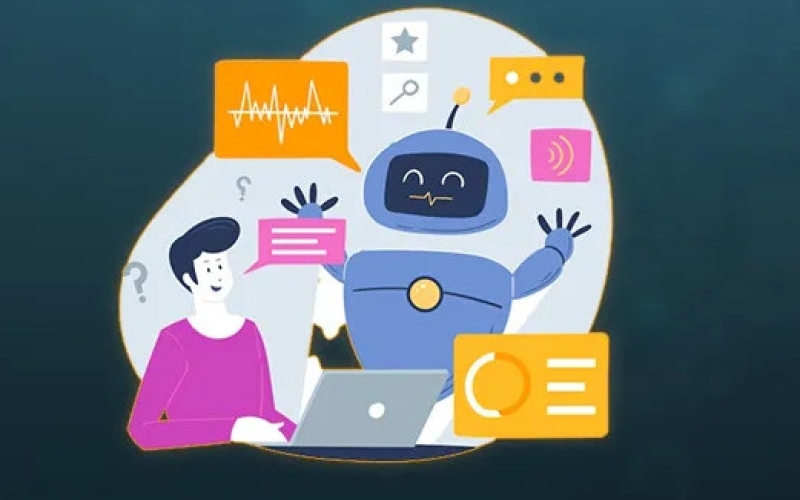
The digital marketing landscape has experienced significant transformation over the years, with artificial intelligence (AI) emerging as one of the most influential drivers of change. From customer engagement to predictive analytics, AI is reshaping how brands interact with their audiences and strategize their campaigns. This article explores the profound impact of AI on digital marketing, highlighting its benefits, challenges, and future potential.
AI and Personalization
One of the most remarkable ways AI has revolutionized digital marketing is through personalization. Consumers today expect brands to understand their preferences and deliver tailored experiences. AI enables this by analyzing vast amounts of data to identify patterns and predict user behavior.
For example, AI-driven algorithms used by e-commerce platforms can recommend products based on a customer’s browsing and purchase history. Similarly, streaming services like Netflix leverage AI to suggest content that aligns with individual viewing habits. This level of personalization enhances customer satisfaction, boosts engagement, and ultimately drives conversions.
Enhanced Customer Engagement
AI-powered chatbots and virtual assistants have transformed customer service. These tools provide instant responses to inquiries, resolve issues efficiently, and are available 24/7. Unlike traditional customer support, which may involve delays and human limitations, AI-driven systems can handle multiple queries simultaneously without compromising on quality.
Moreover, AI tools can analyze the tone and context of customer messages, enabling brands to respond empathetically and appropriately. This fosters a sense of trust and loyalty among customers. For instance, AI chatbots on platforms like Facebook Messenger can provide users with product recommendations, updates, or even step-by-step tutorials, enriching the customer experience.
Data-Driven Decision Making
Data is the backbone of digital marketing, and AI excels at processing and interpreting it. Machine learning models analyze historical and real-time data to provide actionable insights. Marketers can use these insights to optimize campaigns, predict market trends, and identify potential opportunities or threats.
For instance, AI can assess the performance of various ad campaigns across different channels and recommend budget reallocations to maximize ROI. Predictive analytics, another AI-driven capability, helps marketers forecast customer behavior, such as churn probability or likelihood of purchasing a specific product. This empowers businesses to make informed, strategic decisions.
Programmatic Advertising
Programmatic advertising, which uses AI to automate the buying and placement of ads, has become a cornerstone of digital marketing. Unlike traditional methods that involve manual negotiations and placements, AI streamlines the process, ensuring ads reach the right audience at the right time.
By analyzing user demographics, browsing habits, and contextual data, AI ensures hyper-targeted ad delivery. This not only improves ad relevance but also reduces wasted ad spend. Google’s and Facebook’s advertising platforms, for example, utilize AI to help advertisers achieve better targeting and higher engagement rates.
Content Creation and Optimization
AI’s capabilities extend to content creation and optimization. Tools like GPT (Generative Pre-trained Transformer) models can generate high-quality written content for blogs, social media, and emails. While human creativity remains irreplaceable, AI assists by drafting content more efficiently and suggesting improvements based on audience preferences.
Additionally, AI tools help optimize content for search engines. Algorithms analyze keyword performance, user intent, and competitive content to recommend adjustments that enhance visibility and ranking. Platforms like SEMrush and Ahrefs incorporate AI to provide SEO recommendations, making content creation more strategic and impactful.
Visual and Voice Search
The rise of visual and voice search has added another dimension to digital marketing, and AI is at the core of these innovations. AI-powered image recognition allows users to search for products by uploading pictures, while voice assistants like Alexa and Google Assistant process voice commands to deliver results.
Marketers must adapt their strategies to cater to these emerging trends. For example, optimizing for voice search requires focusing on conversational keywords and questions. Similarly, leveraging AI to enhance image recognition capabilities can help brands stay ahead in a visually-driven market.
Challenges and Ethical Considerations
While AI offers numerous benefits, its integration into digital marketing is not without challenges. One significant concern is data privacy. As AI relies heavily on user data to function effectively, marketers must ensure compliance with regulations like the General Data Protection Regulation (GDPR) and California Consumer Privacy Act (CCPA). Mishandling data can lead to legal repercussions and loss of customer trust.
Another challenge is the risk of over-reliance on AI. Automated systems, while efficient, are not infallible. Misinterpretations of data or poorly configured algorithms can lead to misguided strategies. Additionally, there’s the potential for AI to propagate biases present in the training data, which could negatively impact marketing efforts.
Ethically, marketers must navigate the fine line between personalization and intrusion. Excessive use of AI-driven targeting can make customers feel surveilled, diminishing their trust in the brand. Transparency about how data is collected and used is essential to maintaining a positive relationship with consumers.
The Future of AI in Digital Marketing
The role of AI in digital marketing is expected to grow even further in the coming years. Emerging technologies like generative AI, advanced natural language processing, and augmented reality will open new avenues for customer interaction and engagement.
For instance, generative AI could enable the creation of hyper-realistic virtual influencers who represent brands on social media. Similarly, advancements in augmented reality could allow customers to virtually try on products or visualize them in their environment, enhancing the shopping experience.
AI will also play a pivotal role in predictive analytics, helping brands anticipate market shifts and customer needs with greater accuracy. As machine learning models continue to improve, marketers will gain access to deeper insights that drive innovation and differentiation.
Conclusion
AI has undeniably reshaped the digital marketing landscape, offering unprecedented opportunities for personalization, efficiency, and data-driven decision-making. While challenges exist, they can be mitigated through ethical practices, robust data protection measures, and a balanced approach to AI integration.
As the technology continues to evolve, it’s clear that AI will remain a cornerstone of digital marketing strategies. Brands that embrace its potential while addressing its challenges will be better positioned to connect with their audiences, build loyalty, and achieve long-term success.
Comments (0)
📌 By commenting, you agree to follow these rules. Let’s keep HowweBiz a safe and vibrant place for music lovers!












